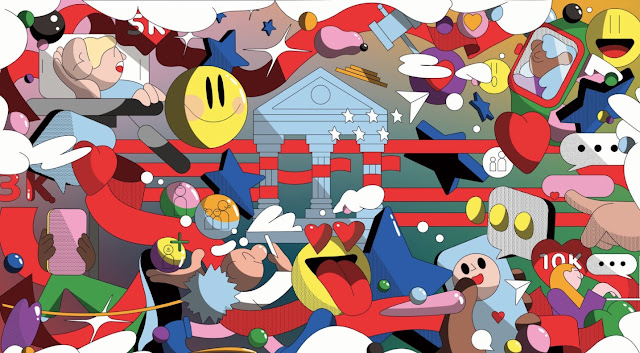This illustration resembles the bubble gum art of the early 60s, flat, superficial and almost always smiling, characteristics one and all of 21st century emojis, cartoon images enabling one to communicate without using words, not necessitating the need to write with any degree of skill but ... in today's world, that's all you need, in part, to become an influencer, a person to be followed as this provides a possible gateway to become a lobbyist internet style.

The "Grinning Face" emoji, from the Twemoji set
AT FIRST GLANCE, the posts appeared to have nothing in common. A Philadelphia-area attorney who proffers financial advice urged her 1,700 Twitter followers to sign up for a credit union. A 23-year-old climate activist in Texas rallied her 49,000 fans on TikTok and Instagram to join a mailing list promoting Democrats in statewide offices. A physical therapist for the elderly in Florida prodded her 3,900 Instagram followers to sign a petition demanding that Congress pass paid medical leave, sharing the story of her grandmother’s battle with dementia. Each of these posts was funded by a well-heeled advocacy organization: the Credit Union National Association, the Democratic Association of Secretaries of State, and UsAgainstAlzheimer’s Action.
Even though none of the people reading these posts knew it, however, they were all made possible by the same company: Urban Legend, a small ad-tech startup operating out of a loft in Alexandria,
Staffed by a plucky 14-person team, Urban Legend keeps its largest asset carefully hidden away inside its servers: an army of 700 social media influencers who command varying degrees of allegiance from audiences that collectively number in the tens of millions. The company has painstakingly cultivated this roster to reflect every conceivable niche of society reflected on the internet: makeup artists, Nascar drivers, home improvement gurus, teachers, doulas, Real Housewives stars, mommy bloggers, NFL quarterbacks, Olympians, and the occasional Fox News pundit.
These influencers are paired with clients on Urban Legend’s private platform, the Exchange, where buyers spell out the parameters of the message they want to push to the public and set a budget. Influencers snatch the best available offers from a menu and are then free to craft the campaign’s message, molding it to the rhythms and vernacular of their followers. Clients only pay for each “conversion” an influencer nets—$1.25, say, for every follower who joins a newsletter. In two years, Urban Legend’s influencers have run more than 400 campaigns, connecting people to its clients millions of times. Henri Makembe, a veteran Democratic campaign strategist in Washington who has worked with Urban Legend several times, compared the concept to “unboxing” videos—when an influencer unwraps and showcases a product sent to them by a brand. Such product influencers are a $15 billion marketing industry. “Now we’re realizing, ‘Oh: We can do that with an idea,’” Makembe says.

Illustration: Maria Frade
Remember ... Like baseball, selling influence is a pastime that rarely gets reinvented.




No comments:
Post a Comment